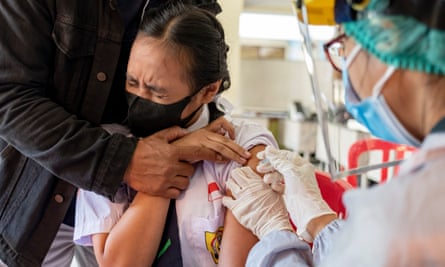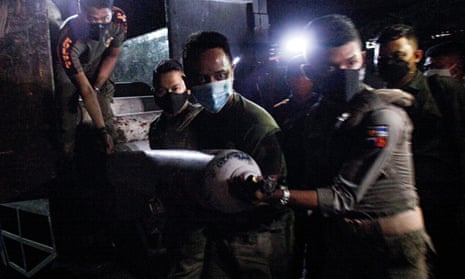The Australian government has been urged to rapidly step up its assistance to Indonesia, amid warnings the sharp rise in Covid-19 cases is fuelling an “escalating crisis right on our doorstep”.
With aid groups fearing the Indonesian health system is on the verge of collapse, and with oxygen and bed shortages reported in some hospitals, there are growing calls for the Morrison government to help its most populous neighbour.
Labor’s foreign affairs spokesperson, Penny Wong, said the situation was “deeply concerning” and Australia “must act now with a comprehensive response to Indonesia’s needs, including the emergency provision of oxygen”.
Indonesia’s president, Joko Widodo, has announced emergency restrictions across Jakarta, Java and Bali as data suggest the Delta variant is now driving the country’s worsening outbreak.
Indonesia reported on Tuesday a record daily high of more than 31,189 new coronavirus cases and 728 deaths, bringing the number of fatalities since the start of the pandemic to 61,868, but the true numbers may be higher because of low testing rates.
The Indonesian government has vowed to triple oxygen supplies to hospitals, which are struggling to cope.
More than 60 people were reported to have died in a hospital where the supply of oxygen nearly ran out last weekend, while the citizen data project LaporCovid-19 has reported being unable to source beds for ill patients.
The aid group Save the Children said unless the international community provided further urgent help, “the Covid crisis in Indonesia will quickly spiral out of control” and “many more children and adults will die”.
Dino Satria, a humanitarian and resilience chief at Save the Children in Indonesia, said there was no sign infection rates would go down anytime soon without urgently speeding up vaccinations.
“The health system is on the verge of collapse – hospitals are already being overwhelmed, oxygen supplies are running out and health services in Java and Bali are woefully ill-equipped to handle this surge in critically ill patients,” Satria said.
“We desperately need more vaccines – that’s the bottom line.”
Ben Bland, the director of the south-east Asia program at the Lowy Institute in Sydney, said the outbreak in Indonesia was “very concerning”.
“Australia should be there for its biggest neighbour in times of need and the Australian government is already providing technical assistance to Indonesia, as well as vaccines through the multilateral Covax initiative,” Bland said.
“But as this pandemic is likely to continue for some time in all affected countries, Australia should be asking the Indonesian government what other help it needs in the weeks and months ahead, whether that’s vaccines or any other support.”
But Wong said the Morrison government had not done enough.
“We know the Morrison government’s $143m contribution to Gavi’s Covax facility to help countries like Indonesia with vaccine supplies pales in comparison to other similar nations,” Wong said.
“The United States has contributed US$5.2bn, Germany US$2.6bn, and the UK and Canada $US1.1bn each – far more per head of population than the Morrison government.”

Wong said the prime minister had “not made Indonesia a priority”, pointing to figures that showed Australia’s health assistance to Indonesia was cut by 87.5% before the pandemic. Bilateral health program funding declined from $62.4m in 2014-15 to just $7.8m in 2020-21.
Last week the ABC quoted Indonesia’s health minister, Budi Gunadi Sadikin, as saying Australia would be donating $77m to help buy vaccines. Guardian Australia has asked the Australian government to confirm the details.
The Greens’ foreign affairs spokesperson, Janet Rice, said this was “nowhere near enough support” for “a population of 270 million facing catastrophic death tolls”.
Rice said Australia must join with the international community to address “a rapidly escalating crisis happening right on our doorstep”.
“Indonesia’s healthcare system is at breaking point, there’s an oxygen shortage, and only about 5% of the country has been fully vaccinated,” Rice said.
“Australia should also donate more of our AstraZeneca stock, especially since the doses have an expiration date and Indonesia is in dire need now.”
Prof Brendan Crabb, an infectious disease researcher and chief executive of the Burnet Institute, stressed the need to “stop Covid in its tracks globally” because more damaging virus variants could emerge from Covid-19 hotspots and present a challenge to the existing vaccines.
Crabb told The New Daily that “the next India-level surge is on” around the world: “It’s a human tragedy, which is reason enough for us all to get busy in helping our neighbours. But we also have every self-interest reason to do it.”
Australia’s foreign affairs minister, Marise Payne, and her department were contacted for comment.
